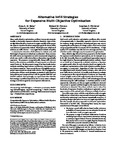Alternative infill strategies for expensive multi-objective optimisation
| dc.contributor.author | Rahat, A | en |
| dc.contributor.author | Everson, R | en |
| dc.contributor.author | Fieldsend, J | en |
| dc.date.accessioned | 2018-10-19T19:51:48Z | |
| dc.date.available | 2018-10-19T19:51:48Z | |
| dc.date.issued | 2017-07-01 | en |
| dc.identifier.isbn | 9781450349208 | en |
| dc.identifier.uri | http://hdl.handle.net/10026.1/12584 | |
| dc.description.abstract |
© 2017 ACM. Many multi-objective optimisation problems incorporate computationally or financially expensive objective functions. State-of-the-art algorithms therefore construct surrogate model(s) of the parameter space to objective functions mapping to guide the choice of the next solution to expensively evaluate. Starting from an initial set of solutions, an infill criterion - a surrogate-based indicator of quality - is extremised to determine which solution to evaluate next, until the budget of expensive evaluations is exhausted. Many successful infill criteria are dependent on multi-dimensional integration, which may result in infill criteria that are themselves impractically expensive. We propose a computationally cheap infill criterion based on the minimum probability of improvement over the estimated Pareto set. We also present a range of set-based scalarisation methods modelling hypervolume contribution, dominance ratio and distance measures. These permit the use of straightforward expected improvement as a cheap inill criterion. We investigated the performance of these novel strategies on standard multi-objective test problems, and compared them with the popular SMS-EGO and ParEGO methods. Unsurprisingly, our experiments show that the best strategy is problem dependent, but in many cases a cheaper strategy is at least as good as more expensive alternatives. | en |
| dc.format.extent | 873 - 880 | en |
| dc.language.iso | en | en |
| dc.title | Alternative infill strategies for expensive multi-objective optimisation | en |
| dc.type | Conference Contribution | |
| plymouth.journal | GECCO 2017 - Proceedings of the 2017 Genetic and Evolutionary Computation Conference | en |
| dc.identifier.doi | 10.1145/3071178.3071276 | en |
| plymouth.organisational-group | /Plymouth | |
| plymouth.organisational-group | /Plymouth/Faculty of Science and Engineering | |
| plymouth.organisational-group | /Plymouth/REF 2021 Researchers by UoA | |
| plymouth.organisational-group | /Plymouth/REF 2021 Researchers by UoA/UoA11 Computer Science and Informatics | |
| dcterms.dateAccepted | 2017-03-20 | en |
| dc.rights.embargoperiod | Not known | en |
| rioxxterms.versionofrecord | 10.1145/3071178.3071276 | en |
| rioxxterms.licenseref.uri | http://www.rioxx.net/licenses/all-rights-reserved | en |
| rioxxterms.licenseref.startdate | 2017-07-01 | en |
| rioxxterms.type | Conference Paper/Proceeding/Abstract | en |


